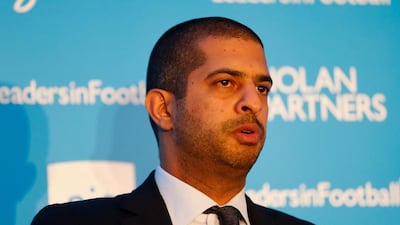COSTA DO SAUIPE, BRAZIL // Palm trees, a white, sandy coastline and a plethora of Fifa officials tucked away inside an exclusive, luxury resort – the Qatari delegation beached in Brazil’s northeast for the next few days could be forgiven for feeling at home.
A small group of representatives from the gas-rich Gulf state are here, at a lavish retreat 90km from Salvador, to observe this weekend’s World Cup finals draw and to take back to Doha vital knowledge required to host its own football showpiece in eight more years.
Tomorrow, each of the 32 countries heading to Brazil for next summer’s World Cup will discover their destiny when teams are divided into eight groups of four. The process has changed substantially since the first World Cup in 1930, when the draw was made almost haphazardly three days before the opening match.
Nowadays, a draw means a lavish, 90-minute spectacle, at minimum, featuring several of Brazil’s most prominent musicians and many of the world’s most recognisable former footballers. Tomorrow’s event has been in planning for months, involves more than 2,700 people, will be attended by the vast majority of the national-team coaches and has cost Fifa more than $8 million to organise.
For the Qataris, it should provide an invaluable insight into the magnitude of what hosting a World Cup involves.
Nasser Al Khater, a member of the Qatar 2022 Supreme Committee, is here as part of an observer programme set up to improve his compatriots’ understanding of the infrastructure and organisational challenges.
“Regardless of the difference in size between the two countries, there are lot of elements that you can learn from, a lot of security elements, a lot of things that you do not think about,” Al Khater said. “I am sure the Brazilian LOC [local organising committee] have a whole list of do’s and don’ts that they will be keen to share with us.”
Qatar’s observer programme, which will also send a delegation to Brazil next June for the main event, is intended to provide venue-management experience to local officials and drive home the enormity of a World Cup to 2022 stakeholders not already familiar with the immensity of football’s six-week global showcase.
“A lot of the people involved that are working indirectly on our World Cup project watch it only on TV,” Al Khater said.
“People who are working on the highways or the metro system or security need to feel the magnitude of the event, so we make sure they are involved and come with us to these events.
“Whether it is a Fifa World Cup or a Uefa Champions League, we want to show them the sheer amount of planning and organisation that is required.”
gmeenaghan@thenational.ae
Follow us on twitter at @SprtNationalUAE

